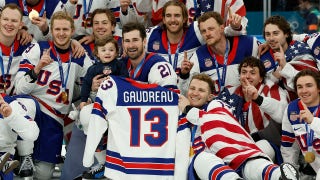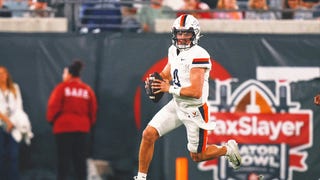“You must go faster,” echoes across the gym and the 15-year-old players stop in their tracks. “Let’s do it again,” coach Marcio Sicoli commands with intensity.
Even though his roots are Brazilian, Sicoli trained and coached U.S. sand volleyball champions Kerry Walsh-Jennings and Misty May-Treanor, who went on to get the gold in the 2012 Summer Olympics.
"When you’re participating in the Olympics, it's truly a world-class level of athletes and the international aspect is one of common respect of being amongst those of the highest level in your sport,” Sicoli said, speaking of the fact that he is Brazilian. “It's the level of accomplishment and not what jersey you’re wearing that matters."
Now he is training the next generation of American volleyball players from middle school through college and will also coach Walsh-Jennings and her new partner to try to bring home another gold for the U.S. in the next Olympics.
Sicoli's style of coaching is Brazilian in both its method and level of passion. Going into his sixth season coaching at Pepperdine University in Malibu, California, he implements not only his physical education degree from Federal University of Rio de Janeiro and his Brazilian Beach Volleyball Level II coaching credential, but also a deep resume of professional working experience with Olympians and pro players.
His coaching technique is so precise he was able to put it into play in an application called iDrills, created to help both indoor and sand coaches.
He believes the greatest thing to learn in volleyball or any sport is to manage emotional status.
“Particularly in group sports, players sometimes forget that the head is at the top, and that’s what controls the body,” he said.
He feels May-Treanor and Walsh-Jennings are smart competitors who understand that concept and, for that reason, his training is compatible with their playing.
“Train extraordinary – and you play extraordinary,” he said. “You have to go out of the box.”
Coach Sicoli is but the tip of the iceberg when it comes to Brazilian influence of volleyball in the U.S. The talent level of both indoor and sand volleyball players in Brazil draws the attention and recruitment from American universities – though under the National Collegiate Athletic Association (NCAA) rules, any foreign students recruited for sports must pass required testing that proves fluency in English. This has left many talented Brazilians without the opportunity for a scholarship, as English isn't an educational requirement in Brazil.
Unlike Brazilian teams, sand volleyball teams in the U.S. didn't initially have coaches and they managed themselves. It wasn't until the success of the Brazilian teams that the American teams took notice of the coaching.
Sicoli was an assistant coach to Brazil’s sand volleyball 2004 Olympic silver medal team when Holly McPeak, American beach volleyball pro, asked him to train her. He went on to successfully coach McPeak along with Olympians Matt Fuerbringer and Casey Jennings and became one of the pioneers in sand volleyball coaching in the U.S.
Sicoli isn't alone in bringing the Brazilian technique and passion to this country. World-renowned Brazilian player Jose Loiola was winning tournaments with his partner Eduardo Bacil when they were asked to play in two major U.S. tournaments on wildcards. He ended up staying in the U.S. and becoming one of the best players of the 90s.
Loiola's Brazilian volleyball career was initially a more typical one, where at the age of 17 he had to choose between going to college or playing profession volleyball.
“It's the Brazilian way to completely focus on the sport, and the general attitude is that you can't do that if you're trying to attend university at the same time," he said.
Loiola feels the American thinking behind collegiate volleyball is better for the player.
"I have a lot of friends in Brazil who've retired from volleyball and are miserable now because they have menial jobs," he said.
After giving up his citizenship to live and work in the U.S., he realized how much better off the American players were once their beach volleyball careers ended — they could pursue other careers.
Loiola is currently studying international business and finance in addition to coaching American players through the Team Wave Club Volleyball in Manhattan Beach, Calif., where Sicoli is also coaching.
But Ricardo “Rico” Guimaraes, a University of Hawaii volleyball alumni and international coach, said while it's commendable many of the U.S. athletes are retiring with a college degree, the country doesn’t have the same base of support as other countries, particularly Brazil.
“The purse is bigger in Brazil and the indoor players will go back,” Guimares said. “Volleyball is a more consistent sport in Brazil –there will always be at least 12 professional tournaments a year in Brazil– this isn't so in the U.S.”
In addition to their private training sessions and collegiate coaching, all three work in the volleyball mecca of Manhattan Beach, Calif., for Club Team Wave, which was started and run by Daron Forbes.
“It’s amazing the level of training the Brazilians bring and I’m incredibly fortunate to be working with these world-class coaches,” Forbes said. “We are keeping the same system that they teach in Brazil – it’s a more consistent way for the kids to learn and creates a tighter game.”








































